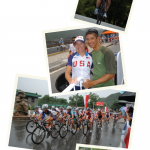“Prioritizing exercise for my own health is the only way to be a role model,” says Dr. Hazel. “Sports is how I de-stress and process what’s going on in my day. Swimming can be quite meditative. You’re alone with your thoughts and get to process them while swimming up and down the lane.”
Lean on Me
After she retired from swimming, medicine was a natural career choice. She always loved science. Although medical school left no time for intense training, she managed to stay fit by cross-country skiing and competed in several triathlons.
“One of the lessons I learned at the University of Florida was that swimming is really a team sport,” says Dr. Hazel. “You need to lean on your teammates when you’re pushing yourself hard. You need people encouraging you, people to rely on.”
That’s exactly how her team functions at McGill University Health Centre, where she is also the assistant dean of post-graduate medical education, faculty lead of competency-based medical education and director of the Young Adult Rheumatologic Diseases Clinic and Transition Program. She says she’s lucky to have the support of great administrators, an amazing nurse and other rheumatologists who bounce ideas off each other. In her research, Dr. Hazel focuses on juvenile idiopathic arthritis and clinical medicine.
“As doctors, we have to be balanced,” says Dr. Hazel. “We have to be healthy. We have to be role models for our patients. Being an athlete sets you up for doing that lifelong.”
Carol Patton is a freelance writer based in Las Vegas.



